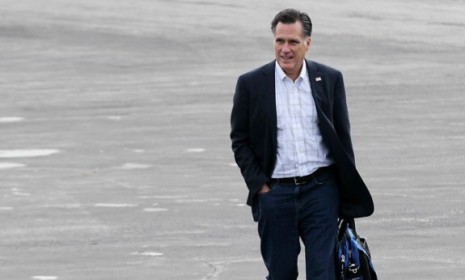Mitt Romney's much-maligned career at Bain Capital: An instant guide
Romney is being called everything from a "vulture capitalist" to a free-market hero. What exactly did he do during his career as a venture capitalist?

A free daily email with the biggest news stories of the day – and the best features from TheWeek.com
You are now subscribed
Your newsletter sign-up was successful
Mitt Romney's critics on both the left and right are attacking him over his time at investment firm Bain Capital. Obama adviser David Axelrod and the Newt Gingrich–aligned super PAC Winning Our Future each branded Mitt a "corporate raider," and Rick Perry called Romney a "vulture capitalist." Conservatives like Rush Limbaugh are hitting back equally hard, criticizing Republicans for attacking free-market capitalism. But getting lost in the politics is Romney's actual career at Bain. Here's what you should know about what Bain does, what it doesn't, and how that might affect Romney's run for the White House:
What does Bain Capital do?
Bain works on both venture capital and private equity deals. The former typically involves Bain buying a small stake in a promising start-up company and trying to help it grow and thrive; the latter focuses on debt-heavy leveraged buyouts of companies. In those cases, Bain's goal is generally to restructure the troubled company, which often involves cutting costs — and jobs. In the beginning, Bain was more of a venture capital shop — Romney often highlights Bain's early $2.5 million investment in Staples — but in the 1990s, it started focusing more on the lucrative private equity side. It's the private equity deals that have drawn criticism on the campaign trail.
The Week
Escape your echo chamber. Get the facts behind the news, plus analysis from multiple perspectives.

Sign up for The Week's Free Newsletters
From our morning news briefing to a weekly Good News Newsletter, get the best of The Week delivered directly to your inbox.
From our morning news briefing to a weekly Good News Newsletter, get the best of The Week delivered directly to your inbox.
What was Romney's role?
He was Bain Capital's founding chief executive, and he led the company until 1999, when he resigned to take over the 2002 Salt Lake City Olympics. Before he was picked to start up Bain Capital in 1984, Romney worked at consulting powerhouse Bain & Co. At least until his unsuccessful 1994 run for U.S. Senate, Romney was by all accounts a very hands-on CEO.
How did Bain do under Romney?
Spectacularly well — for Bain and its investors. The Wall Street Journal examined Bain's 77 biggest deals from Romney's tenure, and found that, thanks largely to 10 of those deals, "Bain recorded roughly 50 percent to 80 percent annual gains in this period, which experts said was among the best track record for buyout firms in that era." Romney himself earned the bulk of his $200 million-plus fortune during these years. The track record for the bought-out companies is a little less rosy, though: Within eight years of Bain's intervention, 22 percent of these 77 companies filed for bankruptcy or shut down, and another 8 percent did so poorly that Bain's investment was wiped out.
A free daily email with the biggest news stories of the day – and the best features from TheWeek.com
Is it fair to call Romney a "corporate raider"?
Some private equity firms do take over companies, saddle them with debt, pay themselves hefty management "fees," then leave the company to die, says Megan McArdle at The Atlantic. But others really do save companies, and jobs. Based on the Wall Street Journal story, Bain could fit either category, and "people are probably going to believe what they want to believe." Look, "Wall Street has its share of the vulture capitalists," says Steven Rattner at Politico, but "Bain Capital is not now, nor has it ever been, some kind of Gordon Gekko-like, fire-breathing corporate raider that slashed and burned companies."
Did Romney really create jobs?
He claims to have created a net 100,000 jobs, arguing that the people currently employed at Staples, Domino's Pizza, The Sports Authority, and other companies Bain invested in or turned around outweigh any jobs lost at other companies through the years. But trying to take credit for jobs created by entrepreneurs he advised or through deals he was tangentially involved in doesn't "pass the laugh test," says Washington Post fact-checker Glenn Kessler, who awards Romney three Pinocchios for his jobs calculus. "I have no idea whether Bain Capital created 100,000 net new jobs, and I think Romney was silly to even engage in that debate," says Rattner at Politico. The bottom line is that Bain "more than fulfilled its responsibility to a gaggle of investors," and that — not job creation — is the company's true purpose.
Will Bain help Romney's election prospects, or hurt them?
Just like Democrat John Kerry's war heroics were in 2004, Romney's company-building business record at Bain is the centerpiece of his bid for the White House, says Dan McLaughlin at RedState. And after these brutal, early attacks, the fear that Bain "will be a political liability is hardly fanciful." Actually, the fact that the attacks came early will help Romney, says Boris Epshteyn at U.S. News. His spirited defense of free-market capitalism is "making him more popular with conservatives than ever," and since his rivals are using the same potentially potent attack in January that Obama will use in the fall, Bain will be "old news when it really counts."
Sources: Atlantic, CNNMoney, Fortune, New Yorker, Politico, RedState, U.S. News, Wall Street Journal (2), Washington Post